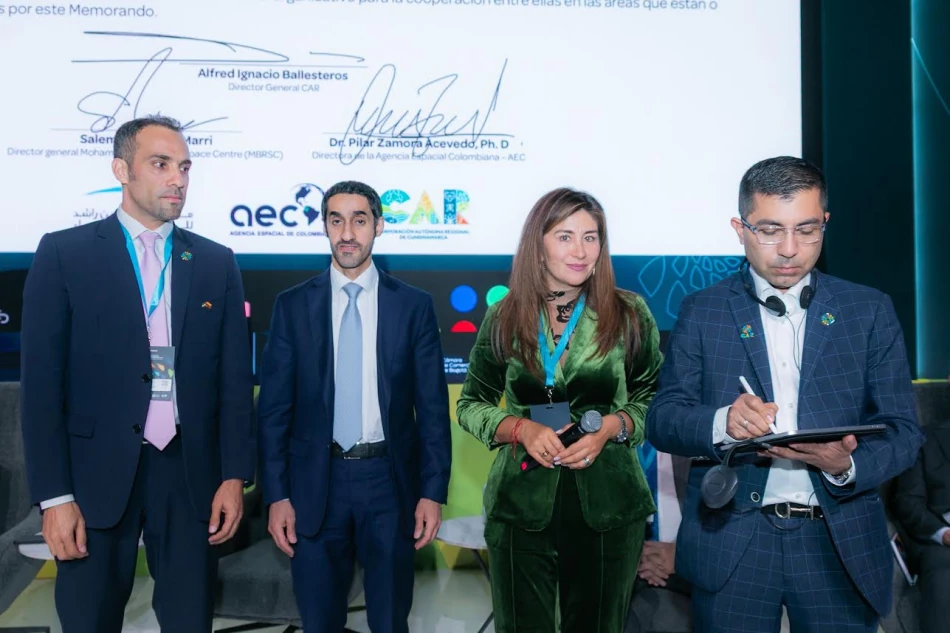
UAE and Colombia Sign Space Cooperation MoU, Unlocking New Frontiers in Aerospace Collaboration
UAE Expands Space Diplomacy with Strategic Colombia Partnership
The Mohammed bin Rashid Space Centre has signed a comprehensive memorandum of understanding with Colombia's space agency and regional authorities, marking another strategic move in the UAE's ambitious plan to establish itself as a global space power through targeted international partnerships. This collaboration with Latin America's fourth-largest economy signals Dubai's intent to diversify its space alliances beyond traditional Western and Asian partners.
Strategic Alliance Takes Shape
The agreement was formalized during an official delegation visit to Colombia, with key figures including Salem Humaid AlMarri, Director General of the Mohammed bin Rashid Space Centre, Dr. Alfredo Ignacio Ballesteros from Colombia's Regional Independent Authority in Cundinamarca, and Dr. Pilar Zamora, founder and CEO of the Colombian Space Agency. The UAE's ambassador to Colombia, Mohammed Abdullah bin Khater Al Shamsi, witnessed the signing ceremony.
The partnership encompasses joint scientific research, knowledge transfer in space sciences, and enhanced mechanisms for sharing satellite data between the two nations. More significantly, it includes capacity building programs designed to develop national expertise in both countries through collaborative technical projects.
Why Colombia Matters for UAE's Space Ambitions
Geographic and Strategic Advantages
Colombia's equatorial proximity offers unique advantages for satellite launches and space observations, particularly for Earth monitoring missions. The country's location provides optimal viewing angles for both Pacific and Atlantic maritime routes—critical for the UAE's growing satellite constellation focused on global trade monitoring and maritime security.
Emerging Market Potential
Latin America represents an underexplored frontier for Middle Eastern space technology. While the UAE has established partnerships with established space powers like the US, France, and Japan, this Colombian alliance taps into a region where Chinese and European space agencies have been gaining influence. The timing suggests Dubai is positioning itself to compete for lucrative satellite services contracts across Latin America.
Broader Context of UAE's Space Strategy
This partnership aligns with the UAE's National Space Strategy 2030, which aims to establish the country as a leading space nation through diversified international collaborations. The strategy has already yielded significant results: the successful Mars mission in 2021, growing satellite manufacturing capabilities, and an expanding roster of international partnerships.
Unlike traditional space cooperation focused primarily on technology transfer, this UAE-Colombia agreement emphasizes mutual capacity building—suggesting both nations view this as a long-term strategic alliance rather than a one-sided technology sharing arrangement.
Market Implications and Investment Opportunities
For investors and space industry stakeholders, this partnership signals several important trends. First, it demonstrates the UAE's commitment to building a global network of space partnerships that could facilitate future commercial ventures. Second, it highlights Colombia's growing ambitions in space technology, potentially creating new market opportunities for satellite services, Earth observation data, and space technology exports.
The agreement's focus on data sharing and joint research projects could particularly benefit companies involved in Earth observation, climate monitoring, and agricultural technology—sectors where both countries have significant economic interests.
Competitive Landscape
This move places the UAE in direct competition with other space-faring nations courting Latin American partners. China has been particularly active in the region through its Belt and Road Initiative, while European space agencies have maintained traditional ties with former colonial territories. The UAE's approach—emphasizing mutual benefit and capacity building rather than dependency relationships—may prove more attractive to countries seeking genuine partnerships rather than client relationships.
As global space commerce is projected to exceed $1 trillion by 2040, securing early partnerships in emerging markets like Colombia could provide the UAE with significant competitive advantages in satellite services, launch facilities, and space technology exports throughout Latin America.
Most Viewed News

 Sara Khaled
Sara Khaled






